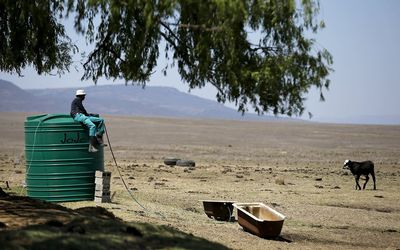SOUTH African municipalities will have one week to report to the Department of Co-operative Governance and Traditional Affairs on the state of water supply in their areas.
The interministerial committee on drought, led by Co-operative Governance and Traditional Affairs Minister Pravin Gordhan, told reporters in Pretoria on Friday that demand management was needed to mitigate the country’s recent water challenges.
The government is preparing to use secure water storage facilities such as dams to replenish those that are strained.
The drought, which has led to five provinces being declared disaster areas, has hit the economy and increased the burden on SA’s water systems. It has also prompted a number of municipalities to impose water restrictions on their residents.
KwaZulu-Natal, the Free State, the North West, the Limpopo Province and Mpumalanga have been declared drought disaster areas. However, KwaZulu-Natal and Mpumalanga have not received funds and assistance because their drought-disaster declarations have not yet been gazetted.
Mr Gordhan said the problem was being exaggerated, saying over the last week that of 1.4-million households in Johannesburg only 50,000 were affected by some kind of water interruption.
"Municipalities must set aside 7% of their budgets for maintenance of water infrastructure. All mayors throughout the country have been given one week to report back to the department on what the status is regarding drought in their area," Mr Gordhan said.
Water and Sanitation Minister Nomvula Mokonyane said while the current situation put pressure on the water systems supplying Gauteng, the challenge was one of "water scarcity" and not drought.
"Drought is understood to be a prolonged abnormal period without rain, lasting more than a season. We are an arid country and we experience drought at a cyclical level every 10 years. Water scarcity occurs when the demand exceeds supply of water, which is what Gauteng is experiencing," Ms Mokonyane said.
She said 173 of the 1,628 water supply schemes nationally, serving 2.8% of the country’s households, were affected by water scarcity.
Environmental Affairs Minister Edna Molewa said that the current weather conditions, caused by an El Niño phenomenon, were likely to last until March next year.
Agriculture, Forestry and Fisheries Minister Senzeni Zokwana told reporters that farmers would be assisted through financing from the Land Bank and the Industrial Development Corporation.
Rural Development and Land Reform Minister Gugile Nkwinti said land parcels had been given to farmers in provinces worst affected by drought.

A farm worker sits on a water tank as he supplies his livestock with water at a farm outside Utrecht, a small town in the northwest of KwaZulu-Natal. Picture: REUTERS/SIPHIWE SIBEKO
SOUTH African municipalities will have one week to report to the Department of Co-operative Governance and Traditional Affairs on the state of water supply in their areas.
The interministerial committee on drought, led by Co-operative Governance and Traditional Affairs Minister Pravin Gordhan, told reporters in Pretoria on Friday that demand management was needed to mitigate the country’s recent water challenges.
The government is preparing to use secure water storage facilities such as dams to replenish those that are strained.
The drought, which has led to five provinces being declared disaster areas, has hit the economy and increased the burden on SA’s water systems. It has also prompted a number of municipalities to impose water restrictions on their residents.
KwaZulu-Natal, the Free State, the North West, the Limpopo Province and Mpumalanga have been declared drought disaster areas. However, KwaZulu-Natal and Mpumalanga have not received funds and assistance because their drought-disaster declarations have not yet been gazetted.
Mr Gordhan said the problem was being exaggerated, saying over the last week that of 1.4-million households in Johannesburg only 50,000 were affected by some kind of water interruption.
"Municipalities must set aside 7% of their budgets for maintenance of water infrastructure. All mayors throughout the country have been given one week to report back to the department on what the status is regarding drought in their area," Mr Gordhan said.
Water and Sanitation Minister Nomvula Mokonyane said while the current situation put pressure on the water systems supplying Gauteng, the challenge was one of "water scarcity" and not drought.
"Drought is understood to be a prolonged abnormal period without rain, lasting more than a season. We are an arid country and we experience drought at a cyclical level every 10 years. Water scarcity occurs when the demand exceeds supply of water, which is what Gauteng is experiencing," Ms Mokonyane said.
She said 173 of the 1,628 water supply schemes nationally, serving 2.8% of the country’s households, were affected by water scarcity.
Environmental Affairs Minister Edna Molewa said that the current weather conditions, caused by an El Niño phenomenon, were likely to last until March next year.
Agriculture, Forestry and Fisheries Minister Senzeni Zokwana told reporters that farmers would be assisted through financing from the Land Bank and the Industrial Development Corporation.
Rural Development and Land Reform Minister Gugile Nkwinti said land parcels had been given to farmers in provinces worst affected by drought.





























Change: 0.41%
Change: 0.46%
Change: 0.46%
Change: 0.49%
Change: 0.39%
Data supplied by Profile Data
Change: 0.10%
Change: -0.16%
Change: 0.41%
Change: 0.00%
Change: -1.12%
Data supplied by Profile Data
Change: -0.16%
Change: -0.37%
Change: -0.27%
Change: -0.68%
Change: -0.61%
Data supplied by Profile Data
Change: 0.17%
Change: 0.07%
Change: 0.07%
Change: 0.84%
Change: -0.49%
Data supplied by Profile Data